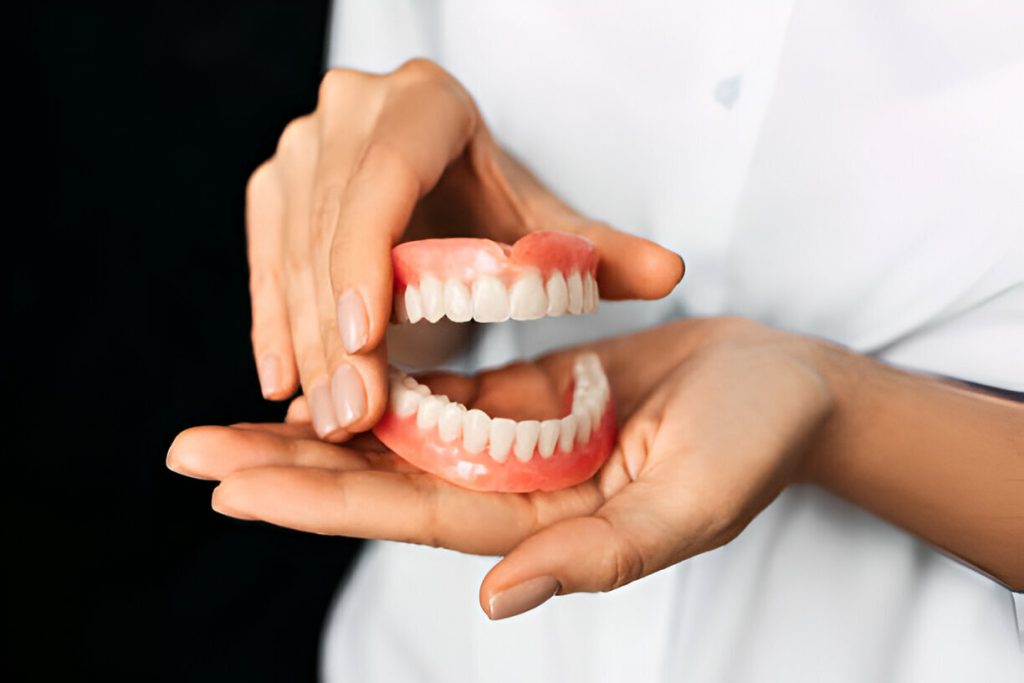Starting with new dentures can feel like a big adjustment, especially if it’s your first time wearing them. They’re excellent for getting your smile back and eating and speaking like you do normally. But as your mouth is adjusting to them, you’ll experience some discomfort. Almost everyone experiences sore spots—small, soft patches where the dentures are touching them—within a few weeks or days of wearing them.
If you are changing over to dentures in Georgetown, knowing about sore spots will help you feel more comfortable and simplify your transition process.
Why Are New Dentures Painful?
At first, when you are first starting out wearing dentures, they won’t be as comfortable in your mouth. Your soft tissues and gums must adjust to the new shape and pressure, even if the fit is perfect. This usually creates sore spots—little spots where the denture bites too hard or puts extra pressure.
Some causes of sore spots are
- Too-loose or too-tight dentures
- Pressure spots against uneven surfaces.
- Food caught under the dentures.
- Irritation caused by chewing or talking
These are usually short-term but can be extremely sore if not treated.
If you’re a recent denture wearer, your dentist near you can help guide you through the settling-in period and offer relief tips that work.
Tips for Easing Denture Pain and Sore Gums
If you’re feeling discomfort, don’t worry—most sore spots can be managed at home with a few easy steps. Here are some tips for easing denture pain and sore gums:
- Rinse with warm salt water: This helps soothe swollen or irritated areas. Mix one teaspoon of salt in a cup of warm water and rinse gently 2–3 times a day.
- Remove your dentures at night: Give your mouth a break and let your gums rest while you sleep.
- Use a denture adhesive: A small amount of adhesive can prevent movement and reduce friction.
- Eat soft foods: Choose yogurt, soups, mashed potatoes, and smoothies until the soreness goes away.
- Avoid hot or spicy foods: These can make the irritation worse.
By following these tips, you’ll reduce pressure on sore areas and help your mouth heal faster.
How to Adjust to New Dentures Faster
Getting used to dentures takes time, but there are ways to make the process easier. If you’re wondering how to adjust to new dentures faster, try the following:
- Practice speaking at home: Reading aloud helps your mouth get used to the way dentures move.
- Take small bites: Cut your food into smaller pieces and chew slowly on both sides of your mouth.
- Wear your dentures regularly: Consistent use helps your mouth adapt more quickly.
- Stay hydrated: A dry mouth can make dentures more uncomfortable.
Staying patient and consistent is key. In a few weeks, most people feel much better and more confident wearing their dentures every day.
When to See a Dentist for Denture Sore Spots
While most sore spots go away on their own, sometimes they don’t. If the pain lasts more than a few days or gets worse, it might be time to seek professional help.
You may be wondering when to see a dentist for denture sore spots? Here are some signs:
- Pain or irritation that doesn’t improve
- Open sores or bleeding spots
- Trouble eating or talking normally
- Loose-fitting dentures that move too much
- Swelling that doesn’t go down.
A quick adjustment by your Georgetown dentist can often solve the issue. They may smooth out rough spots on the denture or suggest a relining to improve the fit.
Is Sore Spots an Emergency Dentistry Issue?
You might ask yourself: Is sore spots an emergency dentistry? The short answer is usually no. Most denture-related soreness is not an emergency. However, if your dentures are causing severe pain, open wounds, or infections, you should see a dentist right away.
Serious discomfort can lead to more complications if ignored, especially if your mouth starts to swell or bleed. When in doubt, it’s always best to check with a dental professional who can evaluate the problem and offer a safe solution.
Home Remedies to Help You Feel Better
In addition to saltwater rinses and denture adhesives, you can try other simple remedies at home:
- Cold compresses: Apply a cold cloth or ice pack outside your cheek to reduce swelling.
- Aloe vera gel: This natural remedy helps soothe sore spots and speed up healing.
- Over-the-counter pain relief: Medicines like ibuprofen can help reduce inflammation and pain.
Always be gentle when cleaning or handling your dentures. Avoid using sharp tools or brushes that can damage them or injure your gums.
How Often Should You Follow Up with Your Dentist?
Regular dental checkups are very important for denture wearers. Even if your dentures feel fine, your mouth can change over time, which might affect how they fit. Visit your dentist every six months or sooner if you’re having problems.
A reliable dentist in Georgetown will check the condition of your dentures, examine your mouth, and make sure you’re healing well. They’ll also clean your dentures and look for signs of irritation or infection before they become serious.
Don’t Suffer in Silence—Get Help from SunnyView Dental Today!
If you’re dealing with sore spots from new dentures, you don’t have to go through it alone. At SunnyView Dental, our friendly team is here to make your adjustment period as smooth and pain-free as possible. Book your appointment today and let us help you enjoy your new smile with comfort and confidence!

